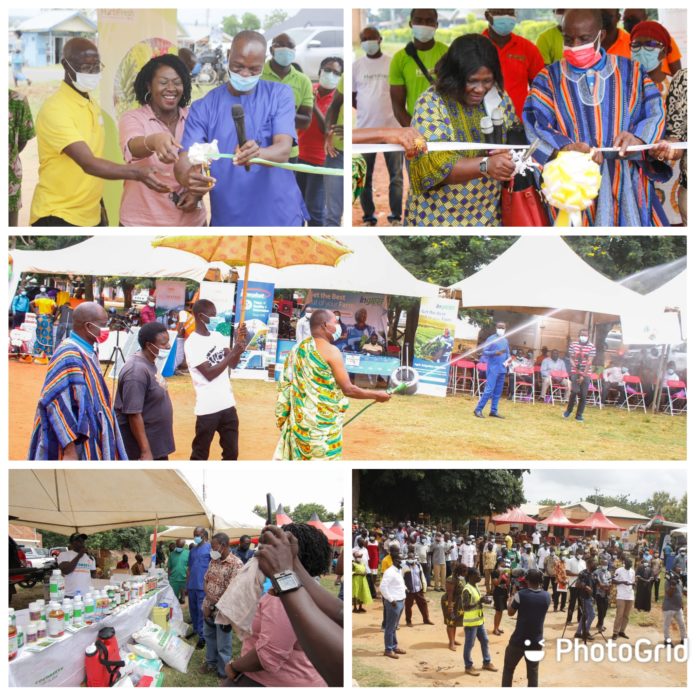The missing collaboration link to promote quality agri-input and sustainable services within the mango sector at the two predominant mango producing regions in Ghana thus, Bono East and Bono Regions has been provided with the theme; “Promoting quality Agri-inputs within the Mango sector for a Competitive Domestic and Export market”.
The Programme Manager of HortiFresh, Sheila Assibey-Yeboah explained that under the cluster development fund at HortiFresh, there are some geographical hotspot enclaves for certain commodities which mango is one of them, however, the enclaves Kintampo, Sunyani, Nkoranza, Pamdu, Wenchi, and Techiman are the biggest hub for mango production in the country.
According to her, sustainable partnership for trade promotion is one of HortiFresh’s critical agenda for the mango farmers, input dealers, service providers, financial institutions, processors, etc. therefore, as brokers this programme would create an avenue for the mango sector to thrive.
She called on the farmers and the processors to use the opportunity available to them at the fair to increase their market span.
“The government has promised to transform the agriculture sector from subsistence to agribusiness to promote and improve farmers’ livelihood, therefore, I urged all the farmers gathered here to take mango farming seriously because it is worth more than gold”, the Hon. Municipal Chief Executive Officer at Kintampo North, Hon. Michael Sarkodie Baffoe said.
Hon. Sarkodie added that the Kintampo enclave is blessed with fertile lands and there is nothing growing across the world that cannot be grown at Kintampo but the dissemination of this good information to attract investors into the enclave is lacking making the lands under-utilized.
He reiterated that mango has more revenue as compared to cocoa, however, farmers and all stakeholders in the mango value should be proud for taking such a noble path, “Mango is a fruit crop that has more benefit than cocoa. Comparatively, mango yields more than cocoa although cocoa has been the backbone of Ghana’s economy for decades yet mango is the game-changer for farmers”.
He acknowledges HortiFresh for its supporting systems in the fruit and vegetable sector and called on sponsors and supporting partners to assist in sustaining the programme to help the farmers.
Nana Owusu Gyare, the Akwamuhene of Wenchi Traditional Area took the opportunity and advised the government to plant more mangoes as part of the ‘Green Ghana’ initiative to give Ghana foreign exchange at the shortest possible time instead of planting Mahogany, Wawa and other trees that takes sixty to hundred (60-100) years to mature.
“Bono and Ahafo regions are transitional zones, we can cultivate mango from here to the Northern Region to curtail the effects of the Sahara in the regions”, Nana Owusu Gyare added.
Speaking to Agric Today, Nana said the government supporting mango plantations would be beneficial to the country in terms of protecting the environment, providing foreign exchange, and creating employment to solve the unemployment rate among the youth.
He thanked HortiFresh for creating such synergies to strengthen and creating market accessibility for the stakeholders especially farmers in the mango value chain.
Conforming to the mango’s benefits over cocoa, the Municipal Director of Agric at Kintampo, Simon Yambor revealed that the mango industry employs more people than the cocoa sector. He confirmed that the mango production process involves more value chain actors been from production, processing to the final consumer than the cocoa sector but the sector is sidelined in terms of synergies to produce the rightful niche for farmers to thrive.
“When one talks of mango production in West Africa, Kintampo is likely to be mention first or second. The environment is friendly for mango production, processing, and marketing but the right collaboration between the farmers, input dealers, and the policymakers is missing and I must commend HortiFresh for this great opportunity”, he said.
Mentioning the factors contributing to the low production in the mango value chain, the Municipal Director said pest and disease, lack of access to skilled labour, low level of technical know-how of the farmers, lack of access to credit, lack of simple and affordable tools and or implements and low level of trust between farmers and processors are the key factors hindering the progress of the sector.
The Bono East Regional Director of Agriculture, Mrs. Cecilia Agyemang entreated mango farmers to practice good agronomical practices for the purpose of growing for human consumption, providing good health for consumers and income.
She emphasized that mango production is a serious business that needs serious farmers to venture into it and to attain high production and better income the farmers must embrace the technological approach of farming.
“I am very glad to hear that farmers who obliged and observed the good agricultural practices from HortiFresh were able to harvest ten (10) tons per acre of mangoes as against two tons per acres they were harvesting priorly”, she gladly said.
“HortiFresh’s capacity building has broadened our knowledge-based and improved our mango farming skills in terms of pest and disease control, pruning, harvesting, fertilization and marketing”, the Chairman of Techiman Mango Farmers Association, Nana Kwaw Adams said.
He called on the government to assist in fighting flu fly attacks in mango farming as he did when to tsetse fly some time ago.
He beseeched the farmers to adhere to the teachings at the various sessions and make good use of them to maximize production.
HortiFresh is a programme supported by the Embassy of the Kingdom of the Netherlands which has prioritized commercial agriculture in its strategic plan of moving from aid trade. The programme’s mission is to establish a sustainable and internationally competitive fruit and vegetable sector that contributes to inclusive economic growth, food and nutrition security in Ghana and Ivory Coast. The Programme aims to reach 15000 farmers and increase their productivity by 20% by 2021.








